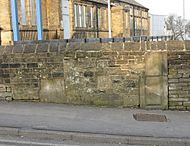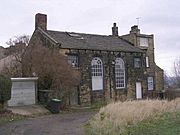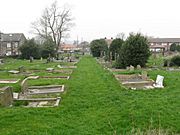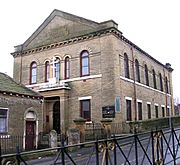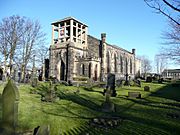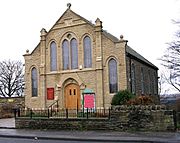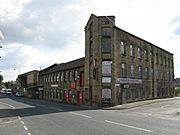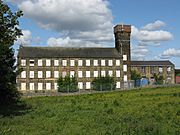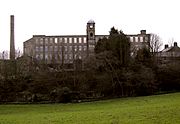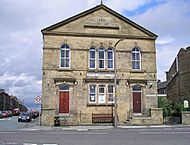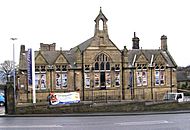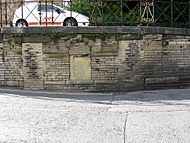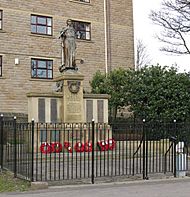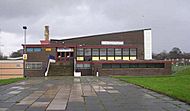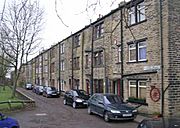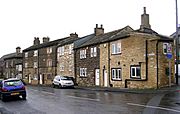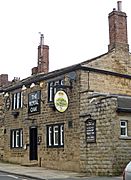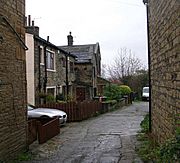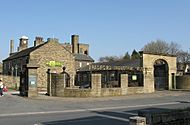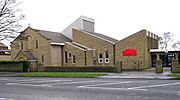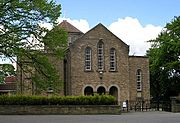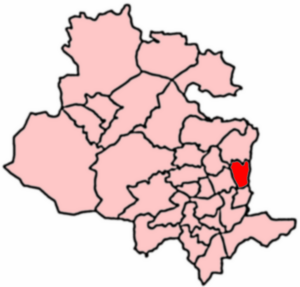Eccleshill, Bradford facts for kids
Quick facts for kids Eccleshill |
|
|---|---|
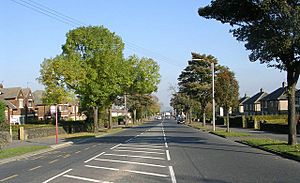 Harrogate Road, Eccleshill |
|
| Population | 17,945 (Ward. 2011 census) |
| OS grid reference | SE175358 |
| Metropolitan borough | |
| Metropolitan county | |
| Region | |
| Country | England |
| Sovereign state | United Kingdom |
| Post town | BRADFORD |
| Postcode district | BD2 & BD10 |
| Dialling code | 01274 |
| Police | West Yorkshire |
| Fire | West Yorkshire |
| Ambulance | Yorkshire |
| EU Parliament | Yorkshire and the Humber |
| UK Parliament |
|
| Councillors |
|
Eccleshill is an area in West Yorkshire, England. It used to be a small village. Today, it's mostly a place where people live. It's part of the City of Bradford Metropolitan District Council.
In 2011, about 17,945 people lived in Eccleshill. The name "Eccleshill" might mean "eagles hill" or "Ecclesiastical Hill" (a hill connected to a church). It could also be named after an old Saxon landlord.
Contents
History of Eccleshill
Eccleshill has a long history! Even in Roman times, two old lanes crossed through the area. One followed what is now Norman Lane. The other went towards Apperley Bridge.
After the Norman Conquest, Eccleshill's land was given to William, Earl of Warren. Over many years, the land changed hands between several important families.
Eccleshill Hall: A Grand Old House
Eccleshill Hall was a large house built in 1713. It stood where Victoria Road is now. The hall was knocked down in 1878. Today, you can still see parts of its old stone gateposts in a wall.
Churches and Chapels
The first places of worship in Eccleshill were for nonconformist groups. Before 1775, the only church was The Quaker Meeting House.
In 1775, a Wesleyan Chapel called Prospect Chapel was built. Famous Methodist leader John Wesley preached there in 1776. A burial ground was added nearby in 1823.
Later, other chapels were built, like Salem Independent Chapel. Many of these old chapels have been replaced or changed. For example, the Congregational Church was built in 1889. It was later replaced by the United Reformed Church.
St. Luke's Church was built in 1848. It has a Gothic style. Its spire was removed around 1971 because the stone was crumbling.
Industry and Work
For a long time, Eccleshill had quarries, potteries, and textile mills. Today, only quarrying remains.
Wool Mills
Eccleshill had several wool mills. The Old Mill on Victoria Road was built in 1800. It burned down but was rebuilt. Union Mill was built around 1816. It made woollen cloth. Both mills were later demolished for a new shopping area.
Moorside Mills was built in 1875 for spinning wool. In 1919, a clock tower was added as a war memorial for those who died in the First World War. This mill is now the Bradford Industrial Museum.
Pottery Making
In 1837, Manor Pottery started in Eccleshill. It used local clay to make stoneware, household items, and garden decorations. Wagons carried clay through a tunnel to the pottery. Eventually, cheaper pottery from other areas meant the pottery closed. It switched to making bricks and pipes.
Coal Mining
There were many coal pits in Eccleshill, especially in the Thorpe Edge and Ravenscliffe areas. Coal was needed for steam engines and the pottery. But digging for coal caused many local water wells to dry up.
Eccleshill Mechanics' Institute
The Eccleshill Mechanics' Institute was built in 1868. It was a place for learning. Later, its upper floor became a cinema called Eccleshill Picture House. It closed in 1931.
Shopping Areas
For the past 200 years, Stony Lane has been the main shopping street in Eccleshill. Henry Sparks, who started Sparks Bakeries, had his first shop here.
Transport History
In 1804, a toll road was built through Eccleshill. Parts of it are now Killinghall Road and Harrogate Road. In 1889, some streets were renamed Victoria Road to celebrate Queen Victoria's Golden Jubilee.
Trams used to run from Bradford to Eccleshill. The tram service also went along Harrogate Road.
Eccleshill Railway Station
Eccleshill railway station opened in 1875. It had sidings and a coal yard. The station closed to passengers in 1931. Goods trains continued until 1964. The railway line and bridge were later removed.
The Palladium/Regal Cinema
The Palladium Cinema opened in 1929 on Norman Lane. It had 1,000 seats! It later became the Regal cinema. It closed in 1966. The building has since been used as a bingo hall, a snooker hall, and a fitness centre.
Schools in Eccleshill
The Central Board School was built in 1887 on Victoria Road. It was later renamed Hutton School. Famous artist David Hockney went to this school. The building was knocked down in 2016 to build houses.
Eccleshill was the first area to elect a School Board in England, after the Education Act of 1871. This board built three schools: Greengates, Wellington, and the Central Board School.
Geography of Eccleshill
Eccleshill is surrounded by other areas. To the east is Pudsey. To the north are Idle and Greengates. To the south are Bradford Moor and Undercliffe. To the west are Swain House and Wrose.
Fagley Area
Fagley is an area in the south-east of Eccleshill. It has a sandstone quarry and a riding school. Most shops and the post office are on Fagley Road. Fagley Primary School is also here.
Ravenscliffe Area
Ravenscliffe is a housing estate in the north-east of Eccleshill. It has a post office and The Gateway Community and Children's Centre. The Eccleshill Adventure Playground is also in Ravenscliffe.
Landmarks and Places to See
At the corner of Stony Lane and Victoria Road, you can find 'The Monkey Bridge'. It's a raised stone path. It overlooks a small area where the village stocks used to be.
North of Stony Lane is The Delph. This used to be a quarry but is now a recreation ground. It has a playground. The Eccleshill War Memorial is also here. South of Stony Lane is another grassy area with Village Green Status.
Eccleshill has many old wells. One is a Holy Well, which dates back to Roman times.
The Eccleshill Swimming Pool is on Harrogate Road. Nearby are the Eccleshill NHS Treatment Centre and Eccleshill Community Hospital. Eccleshill Park is also in this area.
Eccleshill has several post offices. There is also a driving test centre.
Many buildings in Eccleshill are 'listed buildings'. This means they are important for their history or architecture. They include old houses, churches, and former mills.
Bradford Industrial Museum
The Bradford Industrial Museum is in Eccleshill. It's located in what used to be Moorside Mills. The museum shows machinery from local textile and printing industries. You can also see a row of old workers' houses.
Local Churches
The Ukrainian Autocephalic Orthodox Church was built in 1854. It was originally a Wesleyan Methodist Church. It is the only listed church building in Eccleshill.
How Eccleshill is Governed
Eccleshill was its own township until 1899. Then it joined with Bradford. Today, the Eccleshill ward includes areas like Thorpe Edge, Fagley, and Ravenscliffe.
Eccleshill is represented on Bradford Council by three councillors. They are Geoff Reid, Nicola Pollard, and Brendan Stubbs. All three are from the Liberal Democrats party.
Economy and Businesses
Along Victoria Road, you'll find the Victoria Industrial Estate. This area has many businesses and light industries.
A new Lidl supermarket and Starbucks have been built where the old Union Mills used to be. There are also plans for new homes on a former sandstone quarry near Fagley.
Schools and Learning
Eccleshill has Cavendish Primary School and Saint Brendan's Primary School. The Hanson Academy is nearby in Swain House. Eccleshill Public Library is on Bolton Road. Fagley Primary School is on Falsgrave Road in Fagley.
Transport Links
Eccleshill is served by local bus services. The main roads are the A658 Harrogate Road and the A6176 Bolton Road.
Sports in Eccleshill
Eccleshill United Football Club is a local football team. They play in the Northern Counties East Football League Premier Division. Eccleshill also has a Badminton Club.
Culture and Events
The Eccleshill Village Fair is held every year. It takes place in The Delph, which used to be a quarry.
Famous People from Eccleshill
Many well-known people have connections to Eccleshill:
- Artist David Hockney (born 1937) grew up here.
- TV presenter Richard Whiteley (1943–2005) was born in Eccleshill. His family owned a mill here.
- TV presenter Christa Ackroyd (born 1957) was born in Eccleshill.
- Actor Duncan Preston (born 1946) was born in Eccleshill.
- Victorian actress Marie Studholme (1872–1930) was born at Stone Hall.
- Inventor Edward Spurr (1907–1998) grew up in Eccleshill.
- Cricketer Don Brennan (1920–1985) was born here.
- Cricketer Arthur Wood (1898–1973) was born in Fagley.
- Victoria Cross recipient Eric Anderson (1915–1943) lived in Fagley.
 | Ernest Everett Just |
 | Mary Jackson |
 | Emmett Chappelle |
 | Marie Maynard Daly |



